Copyrighted by Týra Alrune Sahsnotasvriunt, 2014.
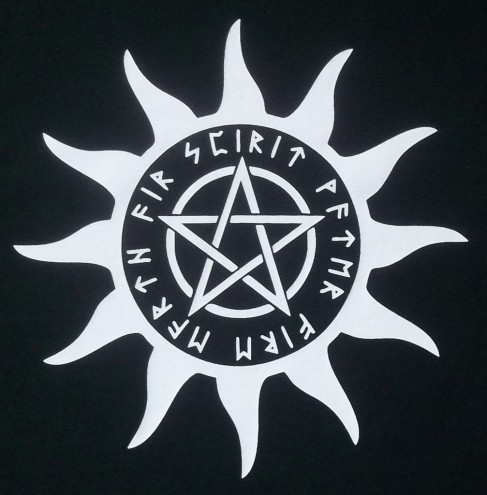
Most Heathens gasp in terror at the notion of Norse Wicca and are quick to point out that Wiccan principles and Eddic ones could never merge, while not even raising a brow at Egyptian, Hellenic , Roman or other types of Wicca.
What riles the majority of them most is Wicca’s alleged “fluffy” nature – the rule of three and harm ye none.
Our Germanic and Norse ancestors were a harsh yet playful people and the revival of the Norse spirituality often forgets the playful and joyful part and instead focuses on the warrior-like nature of it. But ripping one element out of context of a whole spirituality of course makes little sense and thus I proclaim that Norse Wicca comes much closer to our ancestors’ spirituality than what today’s – especially American – Heathens have turned this faith into.

(From the shrines of the Matrons and the Nornen we have the “threefold Goddess”)
Simply because most of our ancestors were in fact farmers, traders and craftsmen rather than Kings and/or heroic Warlords. They lived a life full of austerity during the long, bitter winters, a life filled with hard work and the struggle to survive all year long. They enjoyed games, contest and competition and a rather unceremonious but light-hearted spirituality to compensate for that.
The (folk)lore and sagas were traditionally passed on to the next generation orally and the Eddas themselves were written down in the 1300s by an already christianized Icelander named Snorri Sturlason.
He was in the quandary of having to abide by the strict church laws declaring everything non-Christian heresy and blasphemy under the penalty of death, while still wanting to note down the tales and beliefs of his Norse ancestors.
It may very well be assumed that he had to “compromise” in certain areas, so everything that has been written about our ancestors and that wasn’t taken directly from rune stones must be taken with a grain of salt.
However, the Eddas and especially the Hávamál, the Words of the alleged “High One” aka self-proclaimed “AllFather” Wotan/Odin, regularly speak of retaliation towards one’s enemies as well as a strong moral code of loyalty, honesty, truth, honor and defending yourself and your own, whilst praising physical as well as mental strength.
And it is also by death and carnage, by Wotan’s murder of the Jotun (giant) Ymir, that the nine worlds and ultimately mankind were created.
Wotan’s son Thor is another “giant murderer”, faring to the lands of the Jötnar whenever boredeom strikes him in order to wield his mighty hammer Mjölnir and kill everything in his way.Surtr will burn the worlds at Ragnarök, the Norse equivalent of Armageddon, and there are many more of that nature.
In other words: War definitely IS a common theme in the Eddas, yes. But by far the only one.
There are just as many Gods and Goddesses of a gentler nature, whose stories find lesser recognition amongst the war-struck Heathens of new.
There’s Eostre from which the holiday of the same name, better known as “Easter”, comes from, Hönir who (ast least in the Edda) helped Wotan create the worlds together with Loki and is referred to as “The silent one” which may also be translated to the meek one from old Norse. Eir is the Aesir Goddess of healing, Baldur the God of rebirth, peace and beauty. And on and on it continues.
If we now go back to the principle of “An ye harm none do what you wilt” I personally don’t know one single Wiccan who would attest to that without explaining this a little further. The principle here is not much different from Buddha’s golden rule, Christianity’s “Don’t do unto others as you would have them do unto you”, and many other religion’s central law. It is even rather close to philosopher Immanuel Kant’s categorical imperative.
It is a “Do your best not to harm anyone” or also a “Try to find a solution which will do the least harm to everyone involved.” Harm none otherwise is impossible. Many Wiccans I know eat meat, wear leather shoes, unlike me use a flyswatter, make Freudian slips or get on people’s bad side every once in a while, so to take it completely literal makes little sense of course.
As for the rule of three, “Whatever you do it will come back to you times three” the core of it may just as well be found in the Eddas as “What goes around comes around”. What else is Lokasenna about?:
In this chapter of the Eddas, the Aesir Gods along with Loki, sit in Valhalla enjoying a large feast, when Loki rises to turn to every single God to remind him/her of his/her mistakes, misdeeds (sins) and concludes his statements with personal insults.
And right he is, the arrogant tribe, the reigning “caste” of the Aesir Gods with Wotan – the God of corruption and crime, as their King – will face all their mistakes made out of fear to lose their status and superiority. At Ragnarök, the worlds’ will end. What goes around comes around indeed.
Wicca is not a dualist but a very inclusive religion, it accepts that all of nature and all elements of the circle of life are necessary and beautiful in their own way, not just the stars, the moon, spring blossoms and majestic sunsets, but also thunderstorms, tornados, the food chain and death just as much as life. Gerald Gardner was eager to promote a more positive image for witchcraft and Wicca and emphasized its meeker, gentler and more joyful qualities, but it is more than just that.
Germanic and Norse beliefs are partly very similar to that concept, although they, too, have been twisted and willfully misinterpreted by most “Heathens” or rather Heathen converts.
The Aesir Gods are always holding back the Jötnar and Rökkr Gods (those who will bring about Ragnarök). They are usually deemed chaotic, but in truth they are the evolutionary forces of nature; stagnation and evolution constantly struggling with each other, some say keeping each other in check.
The Vanir are somewhere in between these two, after the Aesir/Vanir war the Vanir were basically annexed but still were not at war with the giants at least. A trinity of balance if you like.
Of course the next thing extremist Heathens will attack is magic (or, as one spat at me, “Your Pagan magjickckk or whatever you call it”.), claiming that our ancestors did not practice magic.
Really!
And what would you call Seidr, Spae and Galdr? Why are there magical incantations or inscriptions on drinking horns, battle helms and weaponry and even other everyday items, found of nearly a thousand years ago?
Did not Wotan himself learn the “womanly” practice of casting the runes, of the magical practices named above? Oh, we had magic alright.
Even a simple Blót by the use of blood already had something magical, meant to weave a connection between man and God or to call upon a certain God or Goddess – hence the name “Blót” simply meaning blood.
Some Heathens, especially those on the fringe of it like Odinists, criticize Ásatrú’s practice of calling upon the four dwarves when creating a Vé (holy space) or beginning a Blót, ritual or holiday celebration, because it is most likely not historical and reminds of calling the four corners. In fact, there is much critique trying to establish new rituals based upon our ancient moral codes, beliefs, lore and the little we know about our religion and magic.
Sadly almost all of it was destroyed due to violent Christianization and thus we have to piece together the facts and fill in the blanks where facts are missing. Maybe it is less about “right and historically authentic” ritual, but much more about the intention behind such a ritual? At least in the case of…simply not having any historical sources to go with?! … After all, over the ages our ancestors had developed and kept developing their practices as well, quite naturally and over time.
And not every tribe held the same beliefs, believed in the same Gods or even knew of them. So maybe a tad more acceptance and open-mindedness would suit our angry Heathen brethren regarding the ideas and concepts of Norse Wicca.
Sadly it is especially an (American) Heathen issue to keep the mindset of monotheism, the “versus mentality” of “If you are not for me you are against me”. Dealing with the Heathen community feels a lot like my time at Catholic church or the mosque. A repressive atmosphere with all too many sugary sprinkles of self-righteousness mixed in. Bon appetit!
As for the celebration of Sabbats, while not all overlap, several of the Germanic and Norse ones are similar to Wiccan ones. Differences would be the Germanic Cake Fest on the first new moon after Yule and the Horse Fest on Sept. 22 (especially important to us Saxons) for example. And the Germanic peoples had no Imbolc but especially in Sweden the Disablot was celebrated around that time of year. So yes, there are a few differences here and there, but there are a few – more than a few – differences in the Germanic, Norse, Anglo-Saxon, Icelandic traditions too, although they were all related. Anyhow, Nordic Wiccans and Germanic and Norse Pagans alike have come up with ways to incorporate the Germanic holy days into the Year of the Wheel and I was happy to witness the merging of Brighid/Imbolc with a wonderful ritual dedicated to Baldur and his wife Nanna. A very thoughtful choice to celebrate Baldur on that day.
What else Norse Wiccans will or will not do varies greatly. As many Heathen kindreds, hofs, cults, sub-cults and the like there are, Norse Wicca is just as versatile, albeit on a more individualistic level without the righteous Heathen condemnation of everything and everyone who disagrees with their views and practices.
Generally, to Norse Wiccans all Gods are still essentially the one God and all Goddesses the one Goddess. Nature is sacred, the Eddas and sagas are the texts they draw strength, wisdom and inspiration from, there are Norse Wiccans focusing more on the Aesir, many on the Vanir and some even on the Rökkr, depending on their personal preferences or inclinations.
Norse Wicca is a small faith, often practiced by solitaries and even covens are not very outspoken and a little shy to speak about their practices. They are sometimes slightly feared by other types of Wiccans because those have already mostly made very negative experiences with Heathens, as much as they are hated and ridiculed by Heathens, labeled “Wiccatru”, fluffy bunnies or much worse.
The use of Norse symbols and symbology is a given, in addition to that Norse Wiccans just like every other Wiccan have the pentagram. Often assigning their patron and matron deities or just the Gods they work closest with to the single points. For example: Fire – Surtr, Air – Loki, Earth – Fjörgyn, Water – Ran and Ether – their personal high god, sometimes Odin as the “AllFather” for the Aesir-oriented Norse Wiccans or Freyr for the Vanatrur or Loki for the Rökkatrur.
It is my sincerest hope that while the hardcore Heathens keep bickering and excluding everyone who dares disagree with them at least Wicca and other Pagan traditions will slowly start being more open towards Norse Wiccans, and that the latter will finally start stepping out of the shadows and claim what is theirs – a rightful place in the worldwide Pagan community.
*
Edit/P.S.: Just for reference, I’m not Norse Wiccan. I got a dozen replies of (American of course) Heathens, half of them all in capital letters (…) the other half offering to teach me “their ways” and told me my religion was as “real” as believing in the Jedi. To those I say: I grew up in the Firne Situ, so I really don’t need your convert opinions on our Northern European ways, thanks. And thanks for proving me right regarding everything I’ve written about you folks on here. 😉


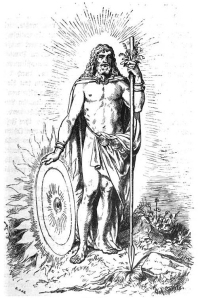

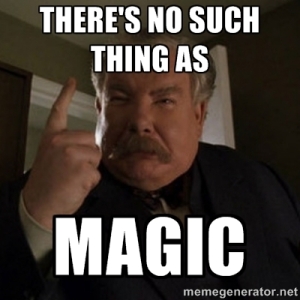
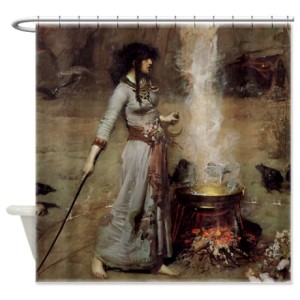

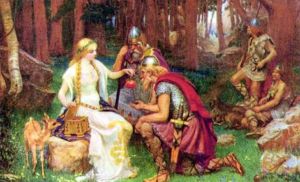

Apr 02, 2014 @ 04:00:05
Reblogged this on Path Of The Celtic Wolf and commented:
Food for thought.
LikeLike
Apr 02, 2014 @ 04:00:26
Wonderfully written.
LikeLike
Apr 06, 2014 @ 06:28:23
Thank you. ❤
LikeLike
Apr 14, 2014 @ 01:33:39
I have my own blog on Norse Wicca and often delete negative comments about how it does not work. Well written – keep up the good work.
LikeLiked by 1 person
Jun 18, 2014 @ 19:29:46
Looking forward to reading your blog!
LikeLike
Jun 14, 2014 @ 08:43:38
Really interested content you have in there.
LikeLike
Jul 30, 2014 @ 23:36:01
I see nothing wrong with Norse Wicca- it is what is- a different religion, a focus on the Norse gods within Wicca. Heathens shouldn’t complain about it, you are being honest and not just practicing Norse Wicca then calling it Heathenry.
LikeLiked by 1 person
Jul 31, 2014 @ 14:41:58
I’ve written about so many different Pagan traditions, Gods, etc. but somehow everyone who reads this blog entry thinks I’m Norse Wiccan. I assume it’s due to my passionate plea for our Norse Wiccan brothers and sisters to start coming forward and not hide anymore; I really do hope for that, and hope for more understanding and cooperation between our different collective as well as individual Norse paths. 🙂
LikeLiked by 2 people
Aug 04, 2014 @ 23:01:16
As one who left Asatru after 20 years, and now find myself Wiccan (to the horror of my former self, lol) this was a wonderful and accurate read. Thank you.
LikeLiked by 1 person
Dec 09, 2014 @ 07:54:47
I guess I’m lucky. Because I’m a Nordic wiccan but all the pagans and wiccans I work with at Wal-Mart are very supportive of me 🙂 the only religious people that tries telling me I’m wrong are the Christians (especially the converts).
LikeLiked by 1 person
Sep 22, 2015 @ 16:47:00
May I just say, I enjoyed this article very much! I spent the past few days reading about both Heathen and Wicca and I’m glad someone put my very thoughts in words!
LikeLike
Dec 21, 2015 @ 21:28:25
I agree and this is very well written. I have a question though. I feel a connection to Sunna even though a lot of people say Freyja is THE goddess. Should I stick with that or ignore it in favor of the sun goddess?
LikeLike
Dec 22, 2015 @ 11:39:20
I think that it would defy the point of polytheism to either place one deity above all others or ignore all other Gods in favor of it although of course everyone has a deeper connection to their patrons and matrons/fulltrui. I am not sure what exactly you mean by “THE” Goddess – the only Goddess worthy of worship and acknowledgement? By far.
We know of 12 main Asen (of which a few are technially Wanen) deities from Snorri; the Saxons for example had even more and partly other Gods unknown to other tribes. So: There is a lot to discover, though perhaps not at once. – So if you feel drawn to something my personal opinion is there is most likely a reason for it and the Goddess Sunna might just have her hand in that. When a deity takes you on a journey you will automatically come in contact with or across information about other Gods and mythical beings and in many cases once you have explored what you can explore with her perhaps another God will take you by the hand. It appears to be like that for quite many people at least, but everyone is different. 🙂
LikeLike
Feb 05, 2016 @ 19:49:38
I started my wiccan path a year ago, I was very familiar with the Greek deities and roman but to my surprise the first deity I met face to face with was hela or hel. So to those who claim that norse has no place in wicca then why when I called out for divine company did she arrive and not hades or hecate?
LikeLiked by 1 person
Apr 16, 2016 @ 12:31:10
Thank you for the well written and well-thought out article. I’m not currently a practising Wiccan, although have been in the past. A friend of mine that I have met recently is a practising Norse Wiccan, so I just wanted to learn some more about it before asking him loads of unnecessary questions!
LikeLiked by 1 person
Aug 07, 2016 @ 08:24:36
Excellent! Thank you for this, as it’s exactly what I’ve been searching for (indeed, an Internet search is what brought me here). Very well written and I think spot on regarding the combativeness and exclusiveness of many in American Heathenism. I truly needed this article tonight and I appreciate the accuracy and balanced view. I was about ready to give up completely on the hope of ever finding something that resonated with me like this article does. It doesn’t take long to grow weary of the incessant squabbling I found so often in the Heathen community (not trying to knock the whole community or make blanket statements, only conveying my experiences).
Again, thanks! I needed this.
LikeLiked by 1 person
Apr 20, 2017 @ 15:37:33
A good starting point for any witch, Norse or otherwise, is “Witchdom of the True,” by Edred Thorsson. This book sheds light on many traditions dealing with the Vanic gods and the principles of thier magic. A must read for any Wiccan or Heathen.
This was a well written article.
Frith
LikeLike
May 06, 2018 @ 02:04:50
Very interesting indeed. I’m very new to Wicca as in haven’t even gotten to my first ritual. Being of Nordic descent I would love to find more information on this.
LikeLike
Jun 17, 2018 @ 23:54:17
I have been Wiccan for 5 years and always interested in Norse religion. This website was very valuable and helpful to me! Thank you for this and forget anyone who is too closed minded to accept the fact that everyone is entitled to their own opinion, even if it is different from theirs.
LikeLike
Oct 05, 2018 @ 19:37:02
I’m interested in learning more. Not interested in convert opinions. I am a pantheist by nature with northern European roots. I’d very much like to get in contact with someone who can tell me more? My email is ericcates25@gmail.com
LikeLike
Jan 25, 2019 @ 19:23:06
Uma pergunta, o que difere a Wicca nórdica do Paganismo Germânico, como o Asatrú ou Vanatrú? Eu por exemplo, sigo o Paganismo Germânico.
LikeLike
May 02, 2019 @ 13:10:14
As outlined on my blog I speak English, Swedish, German, Danish and Norwegian. You may avail yourself to one of these options anytime. 🙂
LikeLike